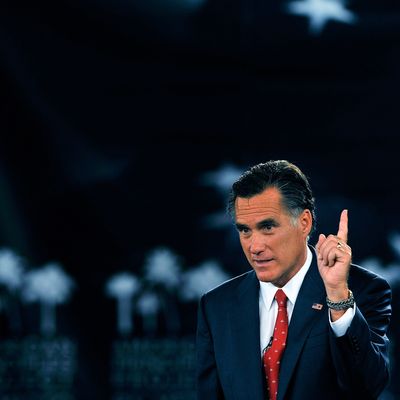
A few weeks ago, Mitt Romney abruptly changed his main campaign message. Before that point, he had been lambasting President Obama as a likable failure, well intentioned but sadly unable to revive the economy. When asked if Obama was a socialist, Romney would deny it outright, insisting he was merely in “over his head.” But starting December 7, Romney began to paint Obama as a sinister radical who had not failed, but had succeeded all too well, in transforming the basic nature of America.
At the time, I thought Romney’s sudden switch was a response to Newt Gingrich’s sudden (and apparently short-lived) challenge from the right, positioning himself to speak more directly to the fears of a freaked-out Republican electorate. But I now think Romney’s campaign has concluded that his old campaign message wasn’t strong enough for the general election. Conservative columnist Kimberly Strassel has a column passing on research findings from American Crossroads, a Republican independent expenditure group. Crossroads surveyed a large number of swing voters and concluded that they couldn’t beat Obama merely by portraying him as having failed:
“To lock down voters in the middle, Republicans are going to have to convince them that Obama isn’t just a flawed and ineffective leader, but that he has an agenda and motivations that they don’t share,” says Steven Law, president and CEO of Crossroads
Strassel presents these findings as advice that Romney needs to take. But I think it’s pretty obvious that Romney has already taken it. His tone toward Obama has grown harsher, and he is now openly (and falsely) calling Obama a socialist who is promoting total economic equality. I’m actually pretty skeptical of this research – the political middle clearly seems to be voters who like Obama but blame him for the poor economy without having a strong ideological understanding of why the economy has failed. But, whatever its merits, this seems to be the strategy Romney has embraced.
The tension between the previous version of Romney and the newest model sprang to the fore when he visited the Wall Street Journal editorial board for a weekend interview. In it, Romney carefully presented himself as an ideologue rather than a technocrat:
[Romney] concludes with even more force, “America doesn’t need a manager. America needs a leader. The president is failing not just because he’s a poor manager. It’s because he doesn’t know where to lead.”
Voters will have to judge the quality of that vision, and how it compares with President Obama’s. But there’s no doubt it’s a contrast with Mr. Romney’s visit to our offices in 2007, which became legendary for its appeal to technocratic virtue.
In that meeting the candidate began by declaring “I love data” and kept on extolling data, even “wallowing in data,” as a way to reform both business and government. He said he’d bring in management consultants to turn around the government, mentioning McKinsey, Bain and the Boston Consulting Group. Mr. Romney seemed to elevate the power of positive technocratic thinking to a governing philosophy.
So it is also notable that now Mr. Romney describes the core failure of Mr. Obama’s economic agenda as faith in “a wise group of governmental bureaucrats” rather than political and economic freedom.
Romney’s problem is that he is, as Jodi Kantor’s New York Times profile shows, a technocrat at heart. He approaches public policy from a data-driven standpoint, searching for solutions that do the most to increase human welfare. This inevitably estranges him from the conservative tradition, which in its essence is a philosophical belief in limited government that holds firm regardless of empirical effects.
It was Romney’s technocratic inclinations that caused him to look at a problem like health care and wind up embracing essentially the same solution that the Obama administration did, which is why conservatives distrust him. The irony is that Romney approaches campaigning the way he approaches governing, obeying the data above all else. If the data tell him to start wildly accusing Obama of abolishing all economic inequality, then that is what he will do.






























